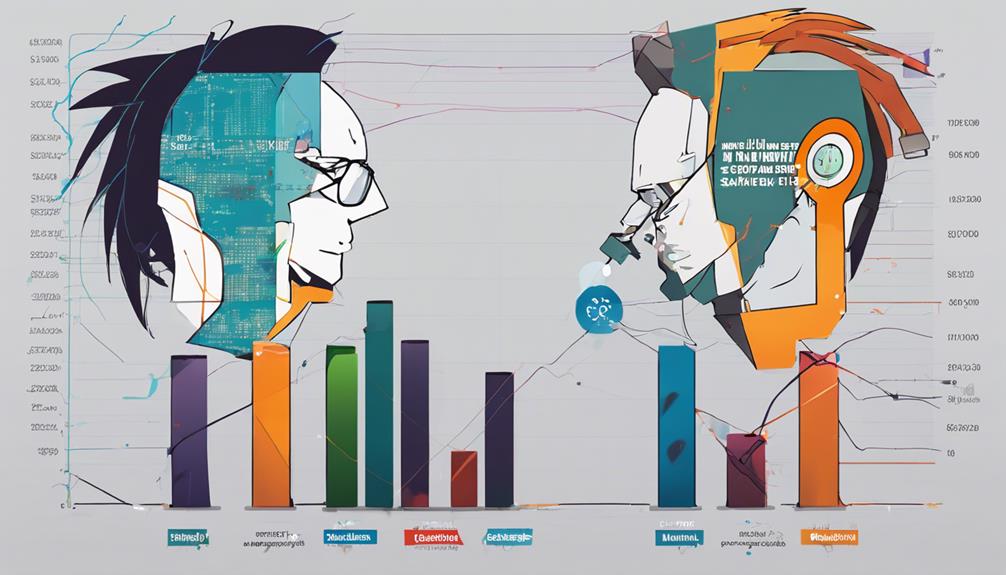In the world of cybersecurity professions, ethical hackers tend to earn higher salaries than software engineers. Ethical hackers make an average of $104,000 annually in the U.S., surpassing the $86,000 earned by software engineers. Top ethical hackers can even earn salaries 2.7 times higher than software engineers, with bug bounty hunters making over 16 times that amount. Factors like location, industry specialization, and bug bounties influence earnings in both fields. The demand for ethical hackers is on the rise due to evolving cybersecurity threats, offering promising career advancement opportunities. Embracing bug bounty programs effectively can lead to significant income disparities.
Key Takeaways
- Ethical hackers earn an average of $104,000 annually, surpassing software engineers' $86,000.
- Top ethical hackers can earn 2.7 times more than software engineers.
- Bug bounty hunters can make over 16 times a software engineer's salary.
- Location, industry specialization, and bug bounties impact earnings for both roles.
- Ethical hacking offers promising career growth opportunities due to increasing demand and evolving cybersecurity threats.
Ethical Hacking Salary Trends
The Ethical Hacking Salary Trends reveal a significant disparity between the earnings of ethical hackers and software engineers in the United States. Ethical hackers, who are cybersecurity experts hired to explore systems to find and fix security vulnerabilities, earn an average salary of $104,000 per year in the U.S. This figure surpasses the median salary of software engineers, showcasing a lucrative career path for those skilled in ethical hacking.
One avenue that boosts the income of ethical hackers is through bug bounties. Some adept bug bounty hunters have been reported to earn over 16 times the salary of a software engineer in their respective countries. This substantial earning potential is a driving force for individuals to immerse themselves in the world of ethical hacking.
Moreover, the top ethical hackers command salaries that are 2.7 times higher than the median salary of software engineers. This disparity underscores the value placed on cybersecurity expertise in today's digital landscape, where protecting sensitive information is paramount.
Software Engineering Salary Statistics

Software engineering salaries vary widely based on several key factors. The average salary for a software engineer in the US stands at $86,000 annually, but this figure can fluctuate greatly due to variables like experience, skills, certifications, and geographic location.
Regional disparities in salaries and the industry in which a software engineer works can also impact their earning potential.
Average Software Engineer Salaries
Within the field of software engineering, the compensation for professionals reflects a range of influential factors. The average salary for a software engineer in the US stands at $86,000 per year. This figure, however, is subject to variation based on several key elements.
Experience plays an important role in determining a software engineer's salary, with seasoned professionals commanding higher pay scales. Additionally, possessing specialized skills, industry-recognized certifications, and being located in major metropolitan areas can all contribute to an increase in salary.
Industries such as financial services and healthcare are known to offer higher compensation packages to software engineers due to the critical nature of their work in these sectors. In addition, independent contractors in software engineering often earn more than their full-time counterparts due to the freelance nature of their work.
Understanding these factors is essential for both aspiring and established software engineers looking to maximize their earning potential in the field.
Factors Affecting Software Salaries
Factors influencing the salaries of software engineers encompass a diverse range of elements that play a significant role in determining compensation within the industry. Experience, skills, certifications, and location are key determinants of software engineer salaries.
Those with specialized skills like ethical hacking may command higher pay due to the increased demand for such expertise in cybersecurity. Industries such as financial services and healthcare tend to offer higher salaries to software engineers, reflecting the critical nature of their work in these sectors.
Additionally, the size of the company also plays a role, with larger corporations and independent contractors often providing more lucrative compensation packages to software engineers. Job type within the software engineering field, such as roles in development, testing, or management, can also impact salary levels.
Understanding these factors is essential for software engineers looking to negotiate competitive salaries and advance their careers in the industry.
Regional Salary Differences
Regional disparities in software engineering salaries reflect the diverse economic landscapes across different geographical locations. In the United States, software engineers in major cities like San Francisco and New York tend to command higher salaries, with an average annual income of around $110,000, compared to the national average of $86,000.
Industries such as financial services and healthcare often offer higher compensation packages to software engineers due to the specialized nature of the work involved. Additionally, larger companies generally provide more competitive salaries to their software engineering professionals compared to smaller firms.
Surprisingly, independent contractors in the software engineering field can earn even more than full-time employees, with the flexibility of setting their rates and choosing projects that align with their expertise. These regional salary differences underscore the importance of considering location, industry, and employment type when evaluating earning potential in the software engineering field.
Factors Influencing Earnings

Location is a key determinant in the variations of salary for ethical hackers, particularly in major metropolitan areas where earnings tend to be higher. Ethical hackers residing in cities like San Francisco or New York often command higher pay due to the increased demand for cybersecurity professionals in these tech hubs.
Additionally, industry specialization can also impact earnings, with sectors like financial services and healthcare offering higher salaries to ethical hackers due to the sensitive nature of the data they handle.
In the ethical hacker community, individuals who participate in bug bounty programs or hack as a hobby may not always earn a steady income but can potentially land lucrative payouts for identifying vulnerabilities. Furthermore, the size of the employing organization plays a role, as larger companies typically have more substantial budgets for cybersecurity, resulting in higher salaries for ethical hackers.
Independent contractors in ethical hacking tend to earn more than full-time employees due to the flexibility and demand for their specialized services. Other factors such as experience, skills, certifications, and job type also play a significant role in influencing the earnings of ethical hackers.
Growth Opportunities in Ethical Hacking
- On the left: A hacker in a hoodie working on a laptop with binary code in the background, symbolizing Ethical Hacking.
- On the right: A software engineer in an office setting with graphs and charts, symbolizing Software Engineering Salary. –v 6 –ar 16:9

Ethical hacking offers promising career advancement opportunities as professionals can specialize in various hacking domains like web application security, network security, and penetration testing.
With the continuous evolution of cybersecurity threats, the demand for ethical hackers is on the rise, leading to competitive salary potential in the field.
Organizations across industries are actively seeking ethical hackers to bolster their security measures, creating a conducive environment for individuals looking to grow and excel in the hacking domain.
Career Advancement in Hacking
Advancing in the field of hacking presents individuals with a multitude of growth opportunities to enhance their cybersecurity expertise and contribute substantially to the protection of digital systems. Ethical hackers are essential in identifying vulnerabilities and improving Cyber Security.
Here are three key aspects regarding career advancement in hacking:
- Hackers' Role in Organizations: Ethical hackers are increasingly sought after by organizations like General Motors and GitHub to assist in fixing security vulnerabilities. Their expertise is valued in fortifying digital systems against cyber threats.
- Vulnerability Disclosure Policy: Ethical hackers play a pivotal role in organizations' vulnerability disclosure policies. By responsibly reporting vulnerabilities they discover, they help companies patch security gaps and improve overall cybersecurity posture.
- Cyber Security Enhancement: The demand for ethical hackers is on the rise as organizations acknowledge the importance of their contributions to Cyber Security. This growth trend provides ethical hackers with ample opportunities for career advancement and professional development within the cybersecurity domain.
Salary Potential in Hacking
Exploring the lucrative domain of ethical hacking reveals promising growth opportunities in relation to salary potential and professional advancement within the cybersecurity sector.
Some top earning bug bounty hunters on platforms like HackerOne have been known to earn over 16 times the salary of a software engineer in their country. Additionally, it is reported that top ethical hackers make around 2.7 times the median salary of software engineers.
While money serves as a significant motivation for ethical hackers, it is essential to note that many also engage in hacking for the love of learning, the thrill of overcoming challenges, and the fun it provides. Notably, a considerable number of hackers are self-taught individuals who view hacking as a hobby in their spare time.
With the majority of ethical hackers being under 35 years old, and over half of them under 25, the field presents a vibrant and youthful landscape for those looking to carve out a rewarding career in cybersecurity.
Demand for Ethical Hackers
The increasing reliance of organizations on skilled cybersecurity professionals highlights a growing demand for individuals adept at identifying and mitigating security vulnerabilities, thereby underscoring the expanding opportunities for ethical hackers in the cybersecurity landscape.
As the digital domain becomes more complex, the need for ethical hackers intensifies. Here are some key points regarding the demand for ethical hackers:
- 81% of hackers say: A significant majority of hackers believe that the demand for ethical hackers will continue to increase as businesses work to fortify their digital defenses against evolving cyber threats.
- Demand for ethical hackers: Companies across various industries are actively seeking ethical hackers to strengthen their cybersecurity posture, recognizing the unique skill set these professionals bring to the table in identifying and remedying vulnerabilities.
- Security professional: The role of an ethical hacker is evolving into an essential aspect of modern cybersecurity practices, with organizations increasingly viewing them as indispensable security professionals capable of safeguarding sensitive data and systems from malicious entities.
Strategies for Maximizing Income

One effective approach to maximizing income in the field of ethical hacking is to strategically focus on high-paying bug bounty programs. Hackers often say they hack not just for the thrill of it but also for the potential financial rewards.
Ethical hackers who excel in bug bounty hunting can earn substantial amounts, sometimes over 16 times the salary of a software engineer in their region. This can translate to a significant income per year, especially for those who actively seek out and report vulnerabilities in various systems.
While a degree in computer science can provide a solid foundation, many successful bug bounty hunters are self-taught individuals who have honed their skills through practice and real-world experience. By continuously improving their technical abilities, staying updated on the latest security trends, and strategically selecting high-value targets, ethical hackers can optimize their income potential in the lucrative field of bug bounty hunting.
Conclusion and Final Thoughts

In summarizing the comparison between ethical hacking and software engineering salaries, it is evident that ethical hackers have the potential to substantially outearn their counterparts in the software engineering field through avenues such as bug bounty programs. The ability to leverage bug bounty programs effectively can lead to significant income disparities between ethical hackers and software engineers.
Here are three key points to take into account:
- Marton Mickos: As the CEO of a bug bounty platform, Marton Mickos has highlighted the substantial earnings potential for ethical hackers who utilize bug bounty programs as a channel to disclose vulnerabilities.
- 16 times the median salary: Some bug bounty hunters have been known to make over 16 times the salary of a software engineer in their respective countries, showcasing the lucrative nature of ethical hacking endeavors.
- 2.7 times the median salary: Top-tier ethical hackers can earn 2.7 times the median salary of a software engineer, further emphasizing the financial benefits that come with excelling in the field of ethical hacking.
Frequently Asked Questions
Who Earns More, Software Engineer or Cyber Security?
In comparing software engineering and cybersecurity salaries, cyber security professionals often earn higher wages due to the specialized nature of their work, increased demand for cybersecurity expertise, and the critical role they play in safeguarding digital assets.
Do Ethical Hackers Make More Than Software Engineers?
Ethical hackers often command higher salaries compared to software engineers due to the specialized nature of their work, demand for cybersecurity expertise, and the critical role they play in safeguarding organizations against cyber threats, making their salaries generally higher.
Do Ethical Hackers Get Paid a Lot?
Ethical hackers can command substantial pay due to their specialized skills and high demand in cybersecurity. Their earnings often reflect their expertise, experience, and success in uncovering vulnerabilities, making ethical hacking a lucrative career path for many professionals.
What Is the Highest Paid Ethical Hacker?
The highest-paid ethical hacker in the field commands a substantial income due to their expertise, experience, and specialized skill set. Their earnings notably surpass those of the average ethical hacker, reflecting the value of their contributions.
Conclusion
In the domain of income, ethical hacking and software engineering both offer lucrative opportunities for skilled professionals.
While software engineers may have a higher average salary, ethical hackers can still earn a substantial income through various strategies and growth opportunities.
Ultimately, the choice between the two professions comes down to personal interests, skills, and long-term career goals.
Just as a skilled artist can create a masterpiece with different tools, both ethical hackers and software engineers can achieve success in their respective fields.









